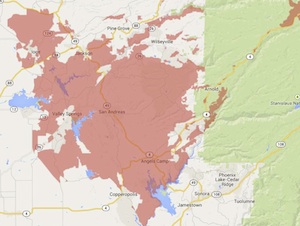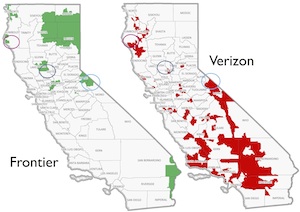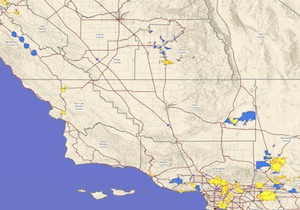![By Grand Parc - Bordeaux, France from France This image was downloaded from Flickr by Medium69. Cette image a été téléchargée depuis Flickr par Medium69. (Pinnochio) [CC BY 2.0 (https://creativecommons.org/licenses/by/2.0)], via Wikimedia Commons](https://www.tellusventure.com/images/2015/3/pinocchio.jpg)
Comcast continues to loudly claim that its proposed merger with Time-Warner Cable and market swap with Charter Communications would not be anti-competitive because it doesn’t compete with either company. Cable operators are geographically separated and overbuilding each other is not economically feasible, Comcast says, so mixing and merging would have no effect on competition.
That’s false, according to a motion filed with the California Public Utilities Commission by its own office of ratepayer advocates (ORA). In the process of going through millions of documents that Comcast and its cohorts have given to the CPUC and the FCC for confidential review, ORA has found, it says, three items that prove that Comcast plans to sell television service via the Internet – over the top (OTT) – that, by its very nature, is not geographically limited…
The significance of these documents cannot be underestimated as they show that competitive entry into the OTT services market can now be accomplished without overbuilding, and therefore, the economic barrier to an OTT service provider entering into an incumbent provider’s operating area, such as Comcast competing head to head against TWC and vice versa, disappears…
The bottom line is that OTT is another example of Comcast using its control of telecommunications facilities to leverage ancillary markets.
…
More



![See page for author [CC BY 4.0 (https://creativecommons.org/licenses/by/4.0)], via Wikimedia Commons](https://www.tellusventure.com/images/2015/3/reach.jpg)

![By Appletkaa1 (Own work) [Public domain], via Wikimedia Commons](https://www.tellusventure.com/images/2015/3/spring_break.jpg)

![By Grand Parc - Bordeaux, France from France This image was downloaded from Flickr by Medium69. Cette image a été téléchargée depuis Flickr par Medium69. (Pinnochio) [CC BY 2.0 (https://creativecommons.org/licenses/by/2.0)], via Wikimedia Commons](https://www.tellusventure.com/images/2015/3/pinocchio.jpg)
![By CercleCM (Own work) [CC BY-SA 3.0 (https://creativecommons.org/licenses/by-sa/3.0) or GFDL (https://www.gnu.org/copyleft/fdl.html)], via Wikimedia Commons](https://www.tellusventure.com/images/2015/3/back_room.jpg)
![By Anton from USA (Chair to the Abdomen) [CC BY-SA 2.0 (https://creativecommons.org/licenses/by-sa/2.0)], via Wikimedia Commons](https://www.tellusventure.com/images/2015/3/chair_to_abdomen.jpg)
![By Fabrizio Sciami (Flickr: Un brindisi per Riccardo) [CC BY-SA 2.0 (https://creativecommons.org/licenses/by-sa/2.0)], via Wikimedia Commons](https://www.tellusventure.com/images/2015/3/dinner.jpg)